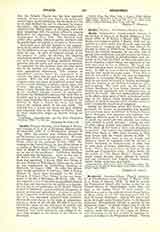

Becquerel, ANTOINE-CESAR.—French physicist, b. at Chatillon-sur-Loing (Loiret), March 7, 1788; d. at Paris, January 18, 1878. In 1806 he entered the Polytechnic School after having studied at the Central School of Fontainebleau under Billy, and later at the College Henri IV with Cauchy. In 1808 he was sent to the military school (d’application) at Metz, which he left the following year with the rank of second lieutenant. During two and a half years, he fought under General Suchet in the Spanish campaign, distinguishing himself at several of the important sieges. Ill health obliged him to ask for a leave of absence. He was raised to the rank of captain, made Chevalier of the Legion of Honor, and nominated to the new position of assistant inspector of studies at the Polytechnic School. During the invasion of 1814 he resumed military service for a time, but was soon retired with the rank of chef de bataillon.
A change of career then became necessary. After some hesitation, he settled down to the real work of his life, the study and advancement of the science of electricity. Becquerel’s achievements are numerous and important. He combated Volta’s contact theory of the electromotive force in a cell and showed that the real source of voltaic electricity is to be found in chemical action. That in fact, the generation of electricity in any case is possible only where there is chemical action, frictional work, or difference of temperature. He observed the diamagnetic properties of the metal antimony before Faraday, and constructed a constant cell with two liquids which was the forerunner of the well-known “Daniell cell”. His differential galvanometer increased the accuracy to be attained in the measurement of electrical resistances. He applied the results of his study of thermo-electricity to the construction of an electric thermometer and measured with it the temperature of the interior of animals, of the soil at different depths, of the atmosphere at different heights. He was also very much interested in questions of meteorology, climate, and agriculture.
Becquerel’s work in electro-chemistry brought him, in 1837, the award of the Copley medal of the Royal Society of London. He was a member of the Academy of Sciences (1829), professor-administrator of the Museum of Natural History, and Commander of the Legion of Honor. His character seems best described by the chemist Dumas: “Becquerel loved his country, his science, his family.” Fizeau ends his funeral oration with these words: “He died with the serenity of a sage and the tranquility of a good man, with confidence in God and the immortal hopes of a Christian“.
More than 500 papers were published in the “Comptes Rendus” in Vols. I-LXXXV, and in the “Annales de Chimie et Physique”, series II-V. The following are some of his more important works: (1) Traite experimental de l’electricite et du magnetisme et de leurs phenomenes naturels (Paris, 1834-40, 7 vols.; 1855, 2 vols.); (2) La physique consideree dans ses rapports avec la chimie et les sciences naturelles (1844, 2 vols.); (3) Elements de physique terrestre et de meteorologie (1847, with his son Edmond); (4) Resume de l’histoire de l’electricite et du magnetisme (1858); (5) Des forces physico-chimiques, de leur intervention dans la production des phenomenes naturels (with plates, Paris, 1873). The title of this book “On the Physico-chemical forces and their intervention in the production of natural phenomena” would appear to indicate a materialistic philosophy. This impression is entirely removed by his explicit statement that “we must admit the existence of a creative Power which manifests itself at certain times”, especially in order to explain the appearance of organic life.
WILLIAM FOX

